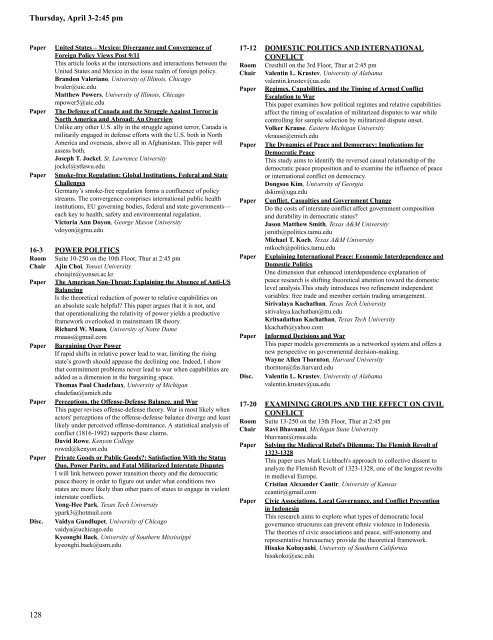2008 Conference Program - Midwest Political Science Association
2008 Conference Program - Midwest Political Science Association
2008 Conference Program - Midwest Political Science Association
You also want an ePaper? Increase the reach of your titles
YUMPU automatically turns print PDFs into web optimized ePapers that Google loves.
Thursday, April 3-2:45 pm<br />
Paper<br />
Paper<br />
Paper<br />
United States – Mexico: Divergance and Convergence of<br />
Foreign Policy Views Post 9/11<br />
This article looks at the intersections and interactions between the<br />
United States and Mexico in the issue realm of foreign policy.<br />
Brandon Valeriano, University of Illinois, Chicago<br />
bvaler@uic.edu<br />
Matthew Powers, University of Illinois, Chicago<br />
mpower5@uic.edu<br />
The Defence of Canada and the Struggle Against Terror in<br />
North America and Abroad: An Overview<br />
Unlike any other U.S. ally in the struggle against terror, Canada is<br />
militarily engaged in defense efforts with the U.S. both in North<br />
America and overseas, above all in Afghanistan. This paper will<br />
assess both.<br />
Joseph T. Jockel, St. Lawrence University<br />
jockel@stlawu.edu<br />
Smoke-free Regulation: Global Institutions, Federal and State<br />
Challenges<br />
Germany’s smoke-free regulation forms a confluence of policy<br />
streams. The convergence comprises international public health<br />
institutions, EU governing bodies, federal and state governments—<br />
each key to health, safety and environmental regulation.<br />
Victoria Ann Doyon, George Mason University<br />
vdoyon@gmu.edu<br />
16-3 POWER POLITICS<br />
Room Suite 10-250 on the 10th Floor, Thur at 2:45 pm<br />
Chair Ajin Choi, Yonsei University<br />
choiajin@yonsei.ac.kr<br />
Paper The American Non-Threat: Explaining the Absence of Anti-US<br />
Balancing<br />
Is the theoretical reduction of power to relative capabilities on<br />
an absolute scale helpful This paper argues that it is not, and<br />
that operationalizing the relativity of power yields a productive<br />
framework overlooked in mainstream IR theory.<br />
Richard W. Maass, University of Notre Dame<br />
rmaass@gmail.com<br />
Paper Bargaining Over Power<br />
If rapid shifts in relative power lead to war, limiting the rising<br />
state’s growth should appease the declining one. Indeed, I show<br />
that commitment problems never lead to war when capabilities are<br />
added as a dimension in the bargaining space.<br />
Thomas Paul Chadefaux, University of Michigan<br />
chadefau@umich.edu<br />
Paper Perceptions, the Offense-Defense Balance, and War<br />
This paper revises offense-defense theory. War is most likely when<br />
actors' perceptions of the offense-defense balance diverge and least<br />
likely under perceived offense-dominance. A statistical analysis of<br />
conflict (1816-1992) supports these claims.<br />
David Rowe, Kenyon College<br />
rowed@kenyon.edu<br />
Paper Private Goods or Public Goods: Satisfaction With the Status<br />
Quo, Power Parity, and Fatal Militarized Interstate Disputes<br />
I will link between power transition theory and the democratic<br />
peace theory in order to figure out under what conditions two<br />
states are more likely than other pairs of states to engage in violent<br />
interstate conflicts.<br />
Yong-Hee Park, Texas Tech University<br />
ypark3@hotmail.com<br />
Disc. Vaidya Gundlupet, University of Chicago<br />
vaidya@uchicago.edu<br />
Kyeonghi Baek, University of Southern Mississippi<br />
kyeonghi.baek@usm.edu<br />
17-12 DOMESTIC POLITICS AND INTERNATIONAL<br />
CONFLICT<br />
Room Cresthill on the 3rd Floor, Thur at 2:45 pm<br />
Chair Valentin L. Krustev, University of Alabama<br />
valentin.krustev@ua.edu<br />
Paper Regimes, Capabilities, and the Timing of Armed Conflict<br />
Escalation to War<br />
This paper examines how political regimes and relative capabilities<br />
affect the timing of escalation of militarized disputes to war while<br />
controlling for sample selection by militarized dispute onset.<br />
Volker Krause, Eastern Michigan University<br />
vkrause@emich.edu<br />
Paper The Dynamics of Peace and Democracy: Implications for<br />
Democratic Peace<br />
This study aims to identify the reversed causal relationship of the<br />
democratic peace proposition and to examine the influence of peace<br />
or international conflict on democracy.<br />
Dongsoo Kim, University of Georgia<br />
dskim@uga.edu<br />
Paper Conflict, Casualties and Government Change<br />
Do the costs of interstate conflict affect government composition<br />
and durability in democratic states<br />
Jason Matthew Smith, Texas A&M University<br />
jsmith@politics.tamu.edu<br />
Michael T. Koch, Texas A&M University<br />
mtkoch@politics.tamu.edu<br />
Paper Explaining International Peace: Economic Interdependence and<br />
Domestic Politics<br />
One dimension that enhanced interdependence explanation of<br />
peace research is shifting theoretical attention toward the domestic<br />
level analysis.This study introduces two refinement independent<br />
variables: free trade and member certain trading arrangement.<br />
Sirivalaya Kachathan, Texas Tech University<br />
sirivalaya.kachathan@ttu.edu<br />
Kritsadathan Kachathan, Texas Tech University<br />
kkachath@yahoo.com<br />
Paper Informed Decisions and War<br />
This paper models governments as a networked system and offers a<br />
new perspective on governmental decision-making.<br />
Wayne Allen Thornton, Harvard University<br />
thornton@fas.harvard.edu<br />
Disc. Valentin L. Krustev, University of Alabama<br />
valentin.krustev@ua.edu<br />
17-20 EXAMINING GROUPS AND THE EFFECT ON CIVIL<br />
CONFLICT<br />
Room Suite 13-250 on the 13th Floor, Thur at 2:45 pm<br />
Chair Ravi Bhavnani, Michigan State University<br />
bhavnani@msu.edu<br />
Paper Solving the Medieval Rebel's Dilemma: The Flemish Revolt of<br />
1323-1328<br />
This paper uses Mark Lichbach's approach to collective dissent to<br />
analyze the Flemish Revolt of 1323-1328, one of the longest revolts<br />
in medieval Europe.<br />
Cristian Alexander Cantir, University of Kansas<br />
ccantir@gmail.com<br />
Paper Civic <strong>Association</strong>s, Local Governance, and Conflict Prevention<br />
in Indonesia<br />
This research aims to explore what types of democratic local<br />
governance structures can prevent ethnic violence in Indonesia.<br />
The theories of civic associations and peace, self-autonomy and<br />
representative bureaucracy provide the theoretical framework.<br />
Hisako Kobayashi, University of Southern California<br />
hisakoko@usc.edu<br />
128










